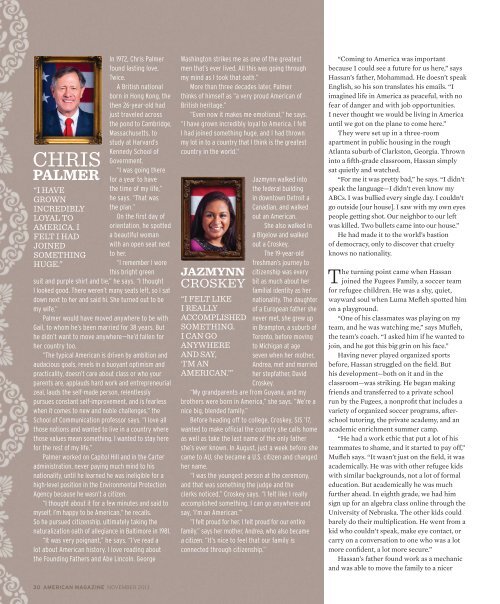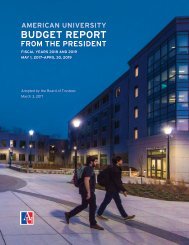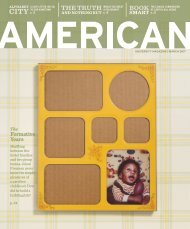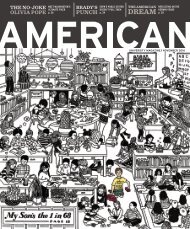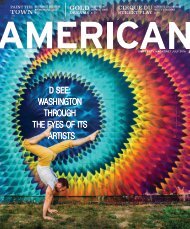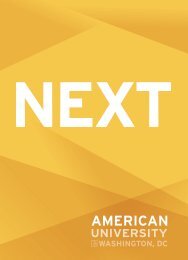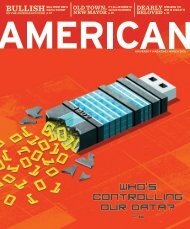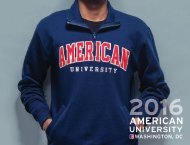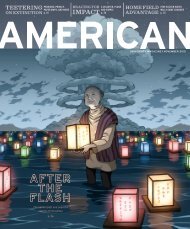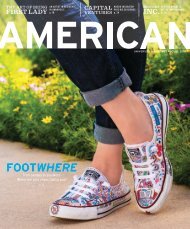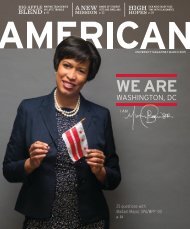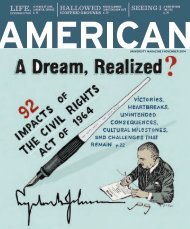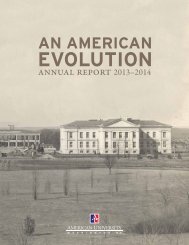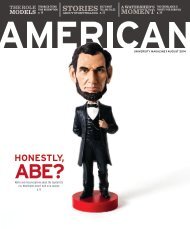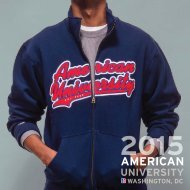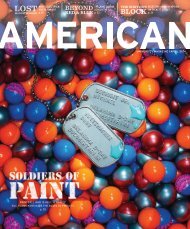You also want an ePaper? Increase the reach of your titles
YUMPU automatically turns print PDFs into web optimized ePapers that Google loves.
“I HAVE<br />
GROWN<br />
INCREDIBLY<br />
LOYAL TO<br />
AMERICA. I<br />
FELT I HAD<br />
JOINED<br />
SOMETHING<br />
HUGE.”<br />
In 1972, Chris Palmer<br />
found lasting love.<br />
Twice.<br />
A British national<br />
born in Hong Kong, the<br />
then 26-year-old had<br />
just traveled across<br />
the pond to Cambridge,<br />
Massachusetts, to<br />
study at Harvard’s<br />
Kennedy School of<br />
Government.<br />
“I was going there<br />
for a year to have<br />
the time of my life,”<br />
he says. “That was<br />
the plan.”<br />
On the first day of<br />
orientation, he spotted<br />
a beautiful woman<br />
with an open seat next<br />
to her.<br />
“I remember I wore<br />
this bright green<br />
suit and purple shirt and tie,” he says. “I thought<br />
I looked good. There weren’t many seats left, so I sat<br />
down next to her and said hi. She turned out to be<br />
my wife.”<br />
Palmer would have moved anywhere to be with<br />
Gail, to whom he’s been married for 38 years. But<br />
he didn’t want to move anywhere—he’d fallen for<br />
her country too.<br />
“The typical <strong>American</strong> is driven by ambition and<br />
audacious goals, revels in a buoyant optimism and<br />
practicality, doesn’t care about class or who your<br />
parents are, applauds hard work and entrepreneurial<br />
zeal, lauds the self-made person, relentlessly<br />
pursues constant self-improvement, and is fearless<br />
when it comes to new and noble challenges,” the<br />
School of Communication professor says. “I love all<br />
those notions and wanted to live in a country where<br />
those values mean something. I wanted to stay here<br />
for the rest of my life.”<br />
Palmer worked on Capitol Hill and in the Carter<br />
administration, never paying much mind to his<br />
nationality, until he learned he was ineligible for a<br />
high-level position in the Environmental Protection<br />
Agency because he wasn’t a citizen.<br />
“I thought about it for a few minutes and said to<br />
myself, I’m happy to be <strong>American</strong>,” he recalls.<br />
So he pursued citizenship, ultimately taking the<br />
naturalization oath of allegiance in Baltimore in 1981.<br />
“It was very poignant,” he says. “I’ve read a<br />
lot about <strong>American</strong> history. I love reading about<br />
the Founding Fathers and Abe Lincoln. George<br />
Washington strikes me as one of the greatest<br />
men that’s ever lived. All this was going through<br />
my mind as I took that oath.”<br />
More than three decades later, Palmer<br />
thinks of himself as “a very proud <strong>American</strong> of<br />
British heritage.”<br />
“Even now it makes me emotional,” he says.<br />
“I have grown incredibly loyal to America. I felt<br />
I had joined something huge, and I had thrown<br />
my lot in to a country that I think is the greatest<br />
country in the world.”<br />
Jazmynn walked into<br />
the federal building<br />
in downtown Detroit a<br />
Canadian, and walked<br />
out an <strong>American</strong>.<br />
She also walked in<br />
a Bigelow and walked<br />
out a Croskey.<br />
The 19-year-old<br />
freshman’s journey to<br />
citizenship was every<br />
bit as much about her<br />
familial identity as her<br />
“I FELT LIKE nationality. The daughter<br />
I REALLY<br />
of a European father she<br />
ACCOMPLISHED never met, she grew up<br />
SOMETHING. in Brampton, a suburb of<br />
I CAN GO<br />
Toronto, before moving<br />
ANYWHERE to Michigan at age<br />
AND SAY,<br />
seven when her mother,<br />
‘I’M AN<br />
Andrea, met and married<br />
AMERICAN.’” her stepfather, David<br />
Croskey.<br />
“My grandparents are from Guyana, and my<br />
brothers were born in America,” she says. “We’re a<br />
nice big, blended family.”<br />
Before heading off to college, Croskey, SIS ’17,<br />
wanted to make official the country she calls home<br />
as well as take the last name of the only father<br />
she’s ever known. In August, just a week before she<br />
came to AU, she became a U.S. citizen and changed<br />
her name.<br />
“I was the youngest person at the ceremony,<br />
and that was something the judge and the<br />
clerks noticed,” Croskey says. “I felt like I really<br />
accomplished something. I can go anywhere and<br />
say, ‘I’m an <strong>American</strong>.’”<br />
“I felt proud for her, I felt proud for our entire<br />
family,” says her mother, Andrea, who also became<br />
a citizen. “It’s nice to feel that our family is<br />
connected through citizenship.”<br />
“Coming to America was important<br />
because I could see a future for us here,” says<br />
Hassan’s father, Mohammad. He doesn’t speak<br />
English, so his son translates his emails. “I<br />
imagined life in America as peaceful, with no<br />
fear of danger and with job opportunities.<br />
I never thought we would be living in America<br />
until we got on the plane to come here.”<br />
They were set up in a three-room<br />
apartment in public housing in the rough<br />
Atlanta suburb of Clarkston, Georgia. Thrown<br />
into a fifth-grade classroom, Hassan simply<br />
sat quietly and watched.<br />
“For me it was pretty bad,” he says. “I didn’t<br />
speak the language—I didn’t even know my<br />
ABCs. I was bullied every single day. I couldn’t<br />
go outside [our house]. I saw with my own eyes<br />
people getting shot. Our neighbor to our left<br />
was killed. Two bullets came into our house.”<br />
He had made it to the world’s bastion<br />
of democracy, only to discover that cruelty<br />
knows no nationality.<br />
The turning point came when Hassan<br />
joined the Fugees Family, a soccer team<br />
for refugee children. He was a shy, quiet,<br />
wayward soul when Luma Mefleh spotted him<br />
on a playground.<br />
“One of his classmates was playing on my<br />
team, and he was watching me,” says Mufleh,<br />
the team’s coach. “I asked him if he wanted to<br />
join, and he got this big grin on his face.”<br />
Having never played organized sports<br />
before, Hassan struggled on the field. But<br />
his development—both on it and in the<br />
classroom—was striking. He began making<br />
friends and transferred to a private school<br />
run by the Fugees, a nonprofit that includes a<br />
variety of organized soccer programs, afterschool<br />
tutoring, the private academy, and an<br />
academic enrichment summer camp.<br />
“He had a work ethic that put a lot of his<br />
teammates to shame, and it started to pay off,”<br />
Mufleh says. “It wasn’t just on the field, it was<br />
academically. He was with other refugee kids<br />
with similar backgrounds, not a lot of formal<br />
education. But academically he was much<br />
further ahead. In eighth grade, we had him<br />
sign up for an algebra class online through the<br />
University of Nebraska. The other kids could<br />
barely do their multiplication. He went from a<br />
kid who couldn’t speak, make eye contact, or<br />
carry on a conversation to one who was a lot<br />
more confident, a lot more secure.”<br />
Hassan’s father found work as a mechanic<br />
and was able to move the family to a nicer<br />
30 AMERICAN MAGAZINE NOVEMBER <strong>2013</strong>


